Expectations to take Stalingrad a sudden blow failed
The Wehrmacht was unable to seize Stalingrad, as was planned by the German command, 25 July 1942. Convinced that Stalingrad could not be taken by the 6 Army alone, the offensive here was suspended until the approach to the 6 Army of two army corps, the 17 and 11.
The German command made a new regrouping of forces: the 4-I tank army, which acted against the troops of the Southern front in the Caucasus, at the end of July 1942, was again transferred to Army Group “B”. The army consisted of the 48 tank corps (14 tank and 29 motorized divisions), the German army 4 corps (94 and 371 infantry divisions) and the 6 Romanian corps. The 6 field army received the task of completely seizing the right bank of the Don and taking Stalingrad with the 4 tank armies. The German high command attached special importance to the capture of Stalingrad, considering that "the fate of the Caucasus will be decided at Stalingrad." The Stalingrad Wehrmacht grouping strengthened in this way was again launched into the offensive. The 4 Tank Army under the command of General Goth 31 July launched an offensive from a bridgehead in the Tsimlyansk region. The Germans moved the main forces along the railway Tikhoretsk - Kotelnikovo, rushing to Stalingrad from the south.
In this direction, the 51 Army held defenses, which had four rifle and two cavalry divisions on the 200-kilometer front from Verkhne-Kurmoyarskaya to the region in 45 km south-west of Zimovniki. This army temporarily (until the beginning of October) replacing the diseased Major General N. I. Trufanova was commanded by his Deputy Major General TK Kolomiets. Using the superiority of forces in the direction of the strike, the German troops broke through the defenses of the 51 Army and August 1 captured Repair, and the next day Kotelnikovo. In the evening of August 3, the advanced units of the 4 of the German tank army reached the r. Aksay, and then began to develop an attack on Abganerovo and Prolificoy, bypassing Stalingrad from the south-west.
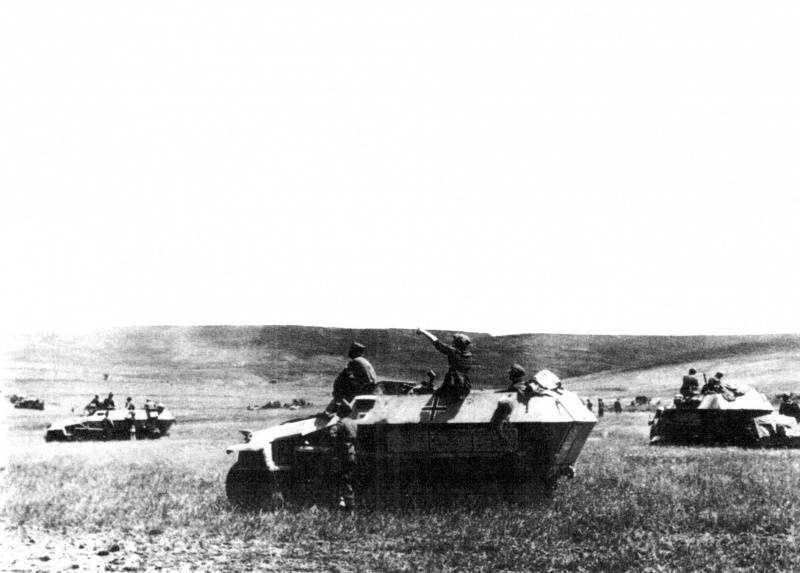
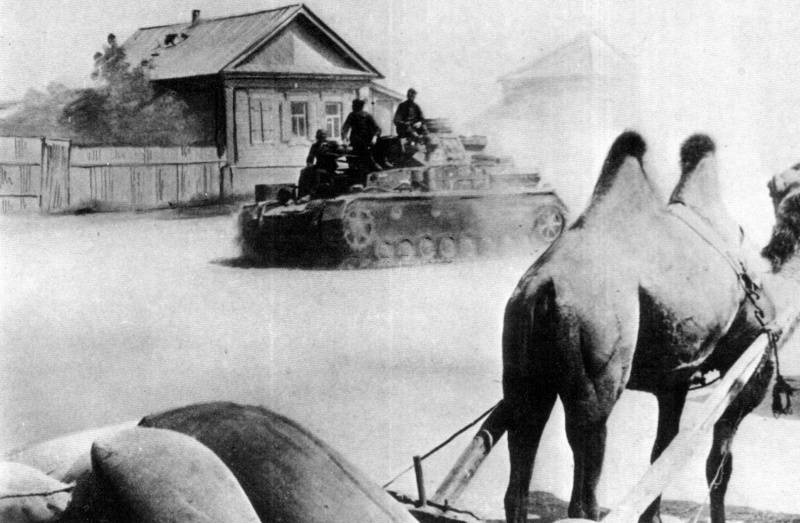
German 4-I tank army in the attack on Stalingrad, crossed the river Sal
The breakthrough of the 51 Army’s defense created a difficult situation for both the 64 Army, as the German troops were on its left flank and communications, and for the entire defense of the Stalingrad region. The 64-I army defended at the turn of Logovskiy, Verkhne-Kurmoyarskaya along the eastern bank of the Don and further along the southern front of the bypass along the r. Aksay, Abganerovo, Fertile, Tinguta. The formations and units of the army were located on different sectors of the front, which made control difficult. So, on the right bank of the Don 229-I, 112-I divisions defended themselves. Therefore, they were included in the 62-th army. At the same time, the 64 Army gave a number of new formations.
At the same time, resistance along the r. Aksai from the weakened troops of the 51st Army and reserve units of the 64th Army that retreated to it, 40 kilometers from the main line of defense. A separate operational group of troops was also formed under the command of Lieutenant General V. I. Chuikov, deputy commander of the 64th Army (the army was then led by an experienced commander, Major General Mikhail Stepanovich Shumilov, who began to fight in the tsar’s army and began the Great Patriotic War war as corps commander). The operational group included the 29th, 138th and 157th rifle divisions of Colonels A. I. Kolobutin. I.I. Lyudnikova and D.S. Kuropatenko, 6th Guards Tank Brigade, 154th Marine Corps, two regiments of Guards mortars. The group was also reinforced by the 208th Infantry Division of Colonel K. M. Voskoboinikov, who had arrived near Stalingrad from Siberia. However, the four echelons of this division, unloaded on August 3 at the Kotelnikovo station, were immediately hit by a powerful German strike. aviation and came under a tank attack. The losses were big.
The situation was extremely difficult. The 64 units were scattered around the army, communication was not established, German mobile units broke through to Abganerovo, covering the left flank of the 64 army, Chuikov's task force. The 38 Division Infantry Division was on the edge of the line. But it was very small, and occupied a large front - up to 20-25 km. And she could not, of course, stop the enemy’s armored forces advancing from the south with her own forces. Luftwaffe dominated the air. Therefore, any movement of troops was carried out mainly at night, and counterattacks were undertaken in the evening or early in the morning, when German aircraft could not effectively act on the battlefield.
At this time, the commander 64 of General Shumilov received the newly arrived 126 rifle division of Colonel VE Sorokin. “Having assessed the situation that the enemy hardly threatened the right wing, since the 62 Army was still fighting for Don, and the center of the army was the most threatened,” said General M. S. Shumilov, “I decided all my reserves and newly arrived To direct the 126 Division to the center and take up a solid defense. ” The 126 Rifle Division managed to take up a defensive line at the front in the Abganerovo area in time. During the fierce battle the Germans were stopped. On the remaining sectors of the front occupied by the 64 army, the enemy also could not continue to break through. As the Germans pulled up their main forces to the battlefield, they approached the Abganerovo area and the units of the 64 Army.
As previously mentioned, the Supreme Command headquarters, in an effort to ease the management of the Stalingrad front, which stretched across the 800 km, on August 5 divided it into two independent fronts, the Stalingrad and the Southeast. Lieutenant-General V.N. Gordov remained commander of the Stalingrad front. Colonel-General A. I. Eremenko was appointed commander of the South-Eastern Front. True, the General Headquarters soon subordinated the Stalingrad Front to the commander of the South-Eastern Front in operational terms. 13 August The rate laid the command of the Federation Council and the South-Eastern Front on Eremenko. V.N. Gordov was appointed his deputies: F.I. Golikov - by the SF. On August 12, Chief of the General Staff A. Vasilevsky arrived in Stalingrad for a few days to help the commanders of the Northern Fleet and the Southern Administrative Fund. On August 18, the Deputy Chairman of the Council of People's Commissars of the USSR, V. Malyshev, was sent to ensure the operation of the enterprises of Stalingrad, which should have strengthened the defense of the city.
The Bids Directive from 5 August set independent tasks for fronts. The Federation Council set itself the task of crushing the enemy, who had broken through the outer defensive line at the junction of the 62 and 21 armies, to restore the former position here, and then securely cover the city from the north-west and west. In the future, the troops of the front were to prepare a counter-attack in the direction of Morozovsk. The SFU was supposed to halt the further advance of the enemy in the southern section of the outer defensive bypass, by all means to prevent the enemy from breaking through the defense here. In the future, the front troops had to strike in the direction of Art. Zhutov, Kotelnikovo, in order to throw the enemy over the river. Sal.
The Stakes Directive of 9 August ended with the following words: “To have in mind both Comrade Eremenko and Comrade Gordov that the defense of Stalingrad and the defeat of the enemy coming from the west and south to Stalingrad is crucial for our entire Soviet front. The Supreme Commander obliges both Colonel-General Eremenko and Lieutenant-General Gordov not to spare forces and not to stop before any victims in order to defend Stalingrad and defeat the enemy. ”
Meanwhile, in the south-west of Stalingrad, the 4-I tank army of Goth continued to break through to the city. The main forces of the enemy's 48 tank corps 6 August focused on the river. Aksai and began to attack the left flank of the 64 Army between Abganerovo and Tinguta. The Germans were attacking the 94 th infantry, 29 th motorized, 14 th and 24 th tank divisions with the support of large aviation forces. During the fierce battles of 7-8 in August, German troops advanced to Tinguta station. Thus, the Germans managed to break through the defenses of the Soviet troops in one sector of the southern sector of the external Stalingrad bypass. The Germans were already just 30 km from Stalingrad, and the danger of the enemy breaking through to the city greatly increased.
It is worth noting that the German troops at that time also acted with the utmost exertion of all forces. Author stories 14 of the Tank Division Rolf Grams noted: “... Tropical heat in the steppes open on all sides, dense clubs of endless dust again demanded extreme stress from people and machines. Only a short lunch break - and a new cast across the sultry steppe. ... These were difficult days for the tank and artillery regiments, the situation was aggravated by the lack of fuel and ammunition. Open steppe spaces gave noticeable advantages to enemy tanks with their wider range of operations. ... The bulk of the technology was in the workshops in Aksai. The situation was no better in the rest of the division. ”
The Soviet command again took extraordinary measures to stabilize the front. “In one day 7 of August,” noted A.I. Eremenko, “all the available reserves and funds were collected. We even had to pick up tank and artillery units even from the formation points, replenish parts of the left flank of the 64 Army, in order to be able to organize a counterattack against enemy forces that broke through the outer contour in the 74 km junction area (A.I. Eremenko. Stalingrad M., 1961.).
Fights were extremely fierce. The Germans threw large numbers of armored vehicles with infantry into battle, they were supported by 200-300 aircraft. In the area of the breakthrough, the Germans had a significant advantage in strength. The 126 and 38-rifle divisions under the command of Colonels V.E. Sorokin and G. B. Safiulina, the 29-division of Colonel A. I. Kolobutin, and other parts heroically repelled the fierce onslaught of the enemy. The Soviet command hastily sent reinforcements. From the right flank of the army, the 204-Infantry Division of Colonel A.V. Skvortsov, three cadet regiments (Krasnodar, 1 and 3-th Ordzhonikidze), 133-I tank brigade were deployed to the enemy’s offensive area. The army was reinforced by the 13 tank corps under the command of Colonel T.I. Tanaschishin, artillery. The 254-I tank brigade, located beyond 250 km from the front, was also thrown to the battlefield under its own power.
The command of the Soviet 64 Army prepared a counterattack against the enemy by the forces of the 204 Infantry Division of Colonel Skvortsov, the cadet regiments and part of the 38 Infantry Division supported by tank brigades. The actions of the ground forces were supported by almost the entire 8 Air Force, which carried out 400-600 sorties per day and long-range aviation. The ground forces also supported the 102-I Fighter Air Defense Division. On the morning of August 9, the 64-I army launched a counterstrike on the enemy. Up to three German regiments were defeated, a significant number of tanks were destroyed. By the end of August 10, the Soviet troops, pushing the Germans aside, entered the outer defensive line. German 4-I tank army, having suffered serious losses during the offensive, went on the defensive. The command of Army Group “B” decided to urgently strengthen this army with tank and infantry divisions from the 6 Army. Persistent battles in this direction continued until August 17.
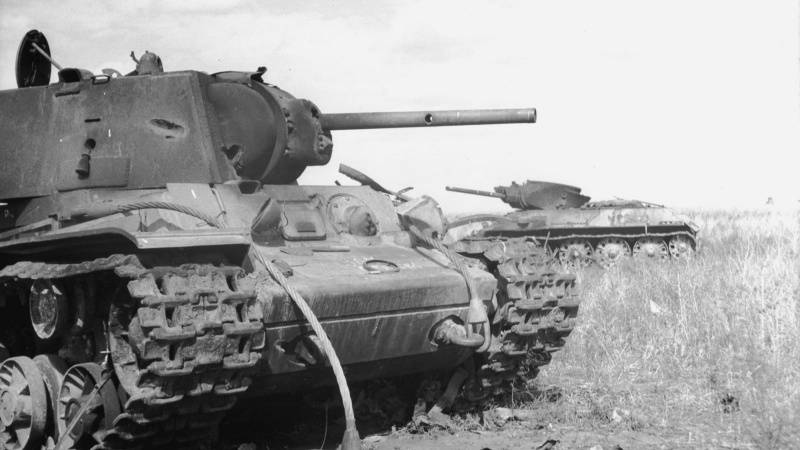
Soviet tanks KV-1 and T-34, shot down in the steppe between the Don and the Volga
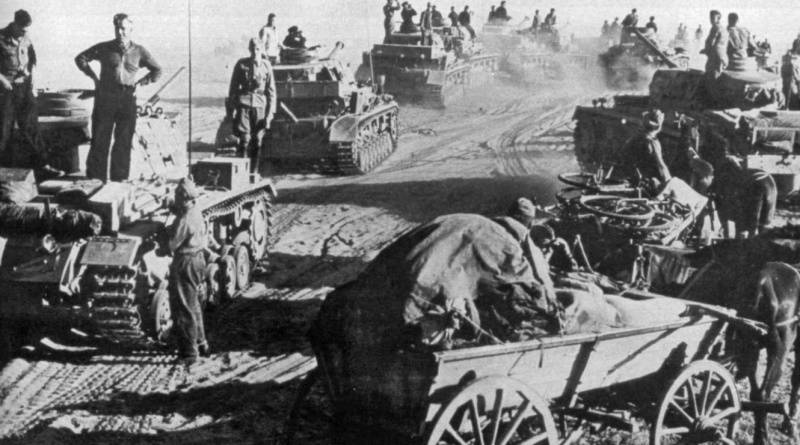
Column 16-th Panzer Division of the Wehrmacht in the attack on Stalingrad
Thus, the 4-I German such army broke through the defense of the 51-th Soviet army and at one of the sites broke through for the external defensive line of Stalingrad, being already in 30 km from the city. The stubborn resistance of the troops of the 64 Army, reinforced by new units and formations, the remaining forces of the 51 Army, restrained the onslaught of the enemy. The counter strike of the 64 Army troops halted the enemy’s rapid attack. 4-I tank army, which suffered heavy losses, temporarily turned to defense, waiting for reinforcements. However, the heroic troops of the 64 Army, stopped the enemy breakthrough at a great price. Many commanders have fallen or been injured; a significant part of the rank and file has failed.
On the way to the advance of German troops to Stalingrad from the south in early August, the troops of the 57th Army under the command of Major General F.I. Tolbukhin took up defense. Until August 14, the enemy did not take any active actions in front of the army, conducted reconnaissance and concentrated his troops. Troops of the 57th Army in cooperation with the Volga Military flotilla were supposed to prevent the enemy from breaking through in the area of Raigorod.
Paulus 6 offensive
In the meantime, on the morning of August 7, 1942 resumed the offensive by the German 6 troops under the command of Paulus, reinforced by the army corps 17 and 11. Striking from the north and south on the flanks of the 62 Army defending west of Stalingrad, the German command sought to encircle and destroy its troops, completely seize the right bank of the Don, and then force the river to break through to the city. The Germans attacked 4 infantry, 4 motorized and 1 tank divisions. Under the onslaught of the overwhelming forces of the enemy, the troops of the 62 Army from August 9 retreated to the left bank of the Don in order to occupy a defense there.
The position of the 62 Army troops remaining on the west bank was becoming more and more dangerous. 13 August they fought surrounded, making their way to the crossings of the Don. Soviet divisions were divided into small groups. After persistent battles that continued until August 14, the troops of the 62 Army retreated to the left bank of the Don and took up defensive positions on the outer defensive line in the area from Vertyachy to Lyapichev. 62-I army suffered serious losses, from its four divisions were small groups that left the environment before 17 August. Thus, the wounded commander of the 33-th Guards Rifle Division, Colonel A. I. Utvenko, brought one hundred and twenty people out of the encirclement.
Our troops everywhere stubborn resistance. Thus, the 20-I motorized rifle brigade commanded by Colonel P. S. Ilyin distinguished. At its disposal on the five-kilometer front in the area of Kalach-on-Don, there were only 1800 people. Artillery weapons were also insignificant. But, skillfully buried in the ground, hiding from bombing and shelling, the Soviet soldiers did not allow the Nazis to the river. On August 15, the sappers of the brigade blew up the bridge over the Don River, and when the enemy brought the crossing, it was also blown up. In battles with the enemy, the brigade (together with the fortified area artillery and machine-gun battalion attached to it) confronted the superior forces of the enemy and caused them considerable damage. Only on the night of September 1, on the orders of the commander of the 62 army, did the 20-i motorized rifle brigade and the units that joined it dismantled and began to withdraw to Stalingrad. The surrounded group left on the Oak Beam to the area of Dar-Mountain, where they occupied the defense north of the Pioneer camps. Here, the brigade, exsanguinated in fierce battles, continued to fight with superior enemy forces for 10 days. Heroically, almost to the last fighter, cadet regiments of the Krasnodar, Grozny, Vinnitsa, 2 Ordzhonikidze schools fought. By the middle of August, only the regiment of the Ordzhonikidze school, which was in the army reserve, existed, the rest of the cadets died a brave death. As a result, the German troops liquidated the bridgehead of the Soviet troops on the right bank of the Don in the Kalach area.
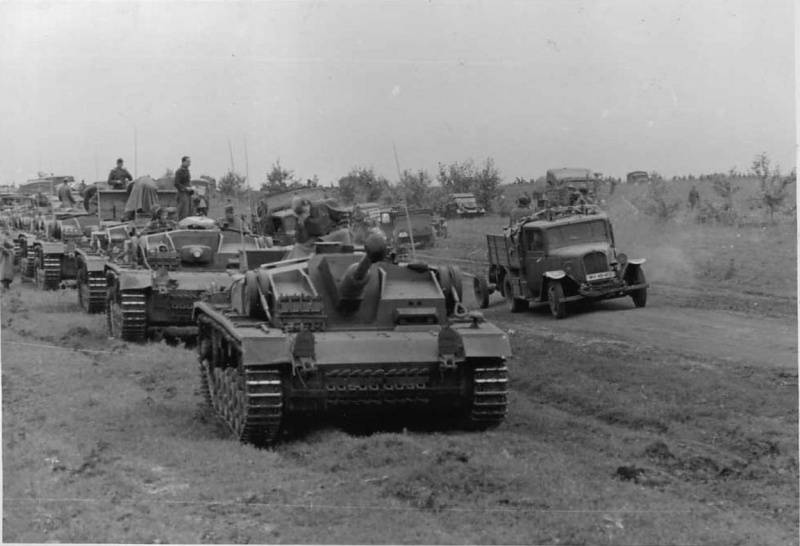
Part of the German 6-th army are attacking Stalingrad. August 1942.
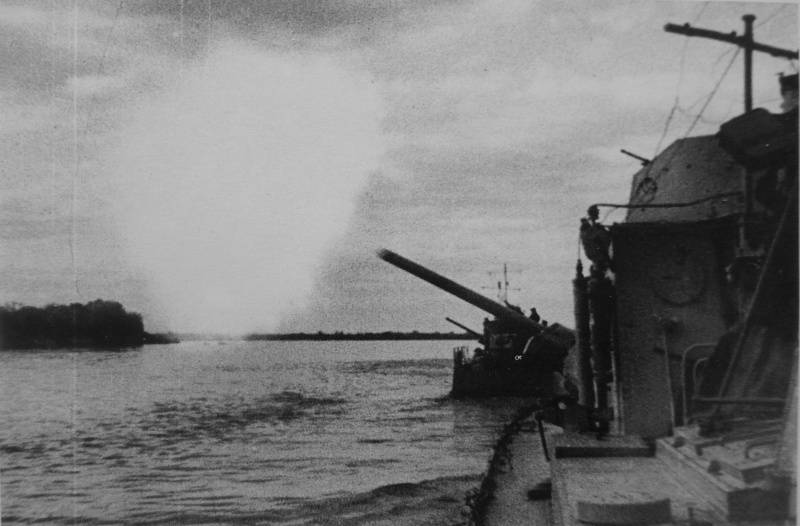
Armored boats of the Volga flotilla firing on the positions of the German troops in Stalingrad
In the middle of August, the Germans delivered a strong new blow to the 4 Tank Army in the direction of Triostrovskaya. German troops literally rammed the defense of General Kryuchenkin’s army and came to the Don with tank wedges. The units of the 192, 205 and 184 infantry divisions did not retreat to the left bank, but stood to death. They were surrounded. The division commander, Colonel K.A. Zhuravlev, was seriously wounded; he was taken out of the encirclement and saved. The division commander was received by the head of the Serebryannikov political department, but he soon died. On August 17, the Germans surrounded the command post of the 753 Infantry Regiment. Staff members fought. The Nazis threw KP grenades and killed the guards. In this battle, the commander of the regiment, Major A.I. Volkov, and the Chief of Staff, Captain A.I. Zaporozhtsev, were killed. The remnants of the 676 and 427 regiments were sent to Sirotinskaya, where the 40-th Guards Rifle Division of the 1-th Guards Army took up the defense the day before.
The next few days, being completely surrounded on the Don right bank, the remnants of 192, 205 and 184 of the rifle divisions more than 30 km made their way through the rear of the enemy to the Don. Out of the environment with weapons and documents, and if not possible - destroyed the technique. They came out in large and small groups in the direction of Golubinsky, Kachalinskaya, Sirotinskaya. Most of them went to Sirotinsky and became part of the 1 Guards Army. Part of the fighters who left the encirclement was sent to Stalingrad to strengthen its defense.
The remaining troops of the 4 Tank Army, with their left flank on August 17, withdrew behind the Don, taking up defensive forces on the outer contour from the mouth of the r. Ilovlya to Vertyachy, and part of the forces (right-flank connections) - to the northeast. Four divisions of the 1 Guards Army, originally intended for the South-Eastern Front, but transferred to the Stalingrad Front, were advanced to the Kremenskaya-Sirotinskaya estuary of the Ilovlya estuary. Initially, the 39-i and 40-i guards divisions under the command of major generals S. S. Guriev and A. I. Pastrevich were unloaded. Then the 37-I and 38-I Guard Rifle Divisions began to arrive. All of them had not had time to complete the formation, but had to immediately join the battle. The 41 Guards Division was on the march. The 37 and 39 divisions strengthened the 4 tank army. The remnants of the 321, 205 and 343 rifle divisions (right flank of the 4 tank army), which were only 700-800 people, were transferred to the 1 guards army. A few days later, the 4-I Guards and 23-rifle divisions also arrived in return for the two units transferred to the tank army. In fierce battles, the Soviet guards stopped the onslaught of the enemy and kept a bridgehead on the right bank of the Don.
In these difficult days, our warriors made more than one feat. August 16 group of fighters of the 40 Guards Rifle Division - N. A. Burdin, P. I. Burdov, I. I. Gushchin, A. S. Dvooglazov, N. V. Dokuchaev, I. N. Kasyanov, V. A Merkuryev, A. And Pukhovkin, M. P. Stepanenko, G. A. Unzhakov, I. N. Fedosimov, N. M. Fedotovsky, V. A. Chirkov, G. F. Stefan, and M. A. Shuktomov in led by junior lieutenant V. D. Kochetkov took the fight at the dominant height at the farm Dubovoy near Sirotinskaya. A handful of fighters repulsed the attack of the advanced enemy detachment, and then the whole company. Heroes fought off 5 attacks. 17 August offensive German infantry supported tanks. For several hours, the Soviet guards fought with the superior forces of the enemy. In the end, only four fighters remained - Stepanenko, Chirkov, Shuktomov and the wounded Kochetkov. Ammunition was consumed. Then the heroes tied grenades and tried to destroy the German tanks. When reinforcements arrived, six wounded German vehicles were discovered. The dying Kochetkov had time to tell about the feat of the guards. And there were lots of fights. So, the Soviet soldiers, died, but stopped the enemy. With each such battle, the “invincible” machine of the Wehrmacht received a small but hole. The turning point in the war was approaching.
The 38-I Guards Rifle Division under the command of Colonel A.O. Onufriev crossed the right bank bridgehead and immediately joined the battles. “In the following days, the enemy continuously attacked our positions all along the leading edge. However, he did not succeed anywhere. This time, he was not helped by the support of aviation, which fiercely bombed the battle formations of the defenders and the crossing of the Don. ” In the 1-th Guards Army, the enemy could not force Don.
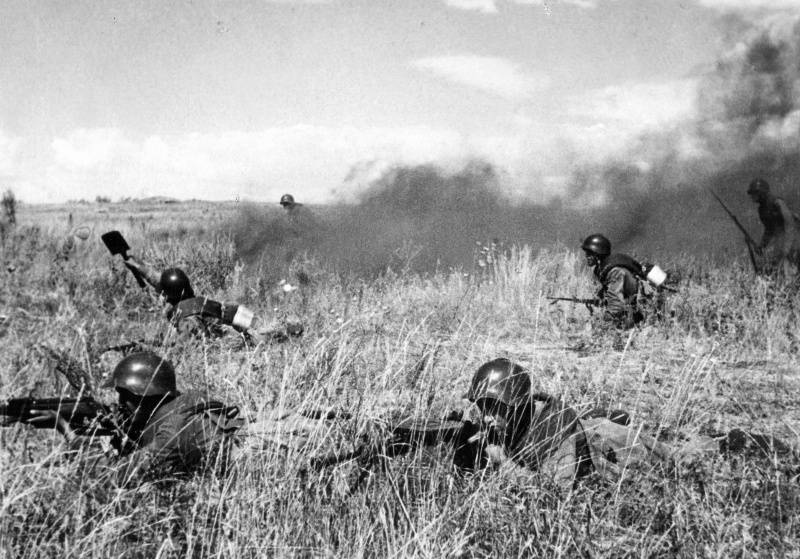
Soviet fighters repel attacks of German troops rushing to Stalingrad
Thus, thanks to the heroism of the Soviet soldiers, the complete mobilization of the available forces and the transfer of reserves to the Stalingrad area, the German command’s attempt to take Stalingrad on the move finally failed. Within a month, fierce battles were fought, the enemy rushed forward, but breaking through the Soviet defenses, he met new barriers. Our troops inflicted counterattacks, tried to reject and suspend the offensive of the enemy. “Expectations to take Stalingrad with a sudden blow,” subsequently admitted Paulus, commander of the 6 army, “finally suffered a collapse.”
With the release of the Germans to the outer defensive line, the first stage of the Wehrmacht offensive operation ended. From 17 July to 17 August 1942, the German army advanced 60-80 km. German troops were in 60-70 km from the city from the west, and just 20-30 km from the south. Two strike forces of the enemy hung from the north and south over Stalingrad, and the German army maintained overall superiority over Soviet troops. The Germans continued to rush forward to the Volga. The idea of the enemy was obvious: to seize Stalingrad by applying a concentric strike from the north and south.
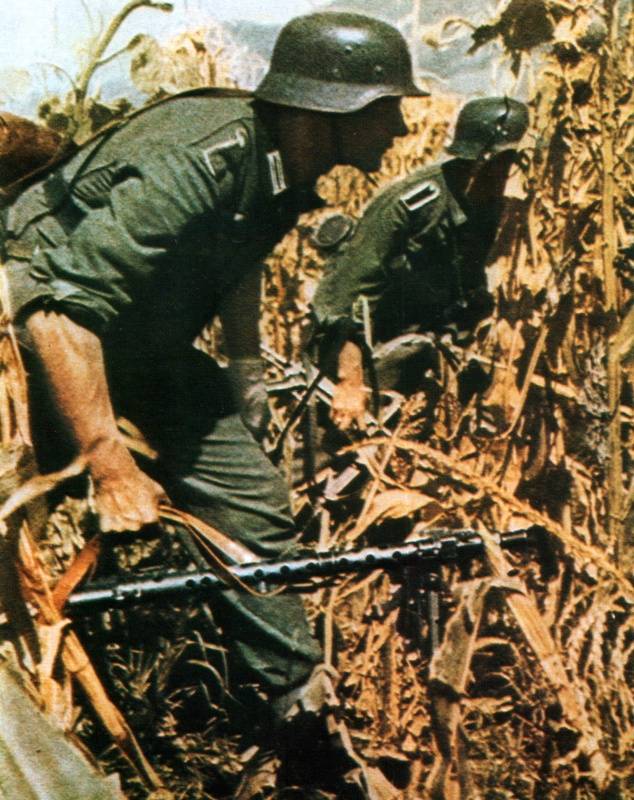
German machine gun in the attack on Stalingrad
To be continued ...
- Alexander Samsonov
- 1942 Campaign
The Third Reich again goes on the offensive.
"The whole Russian front was falling apart ..." Wehrmacht breakthrough in the southern strategic direction
Stalingrad Fortress
1942 year. "The operation in the south develops without stopping"
How the German army broke through to Stalingrad
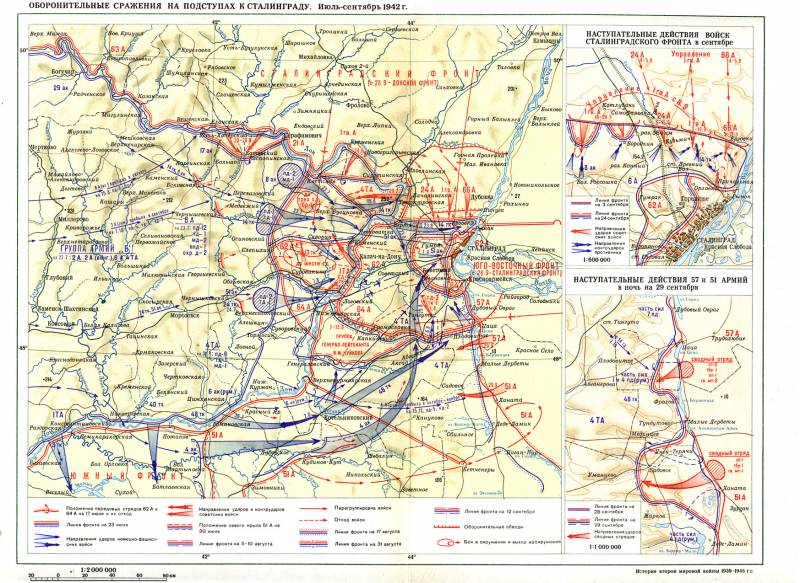
Information